On 27 March 1919, three months prior to concluding the peace agreement in Versailles, the foreign trading company that shares the family name and is still under its ownership today – and which at first focused primarily on trade with raw jute – was founded by Wilhelm G. Clasen under the most difficult of circumstances.
From today’s perspective, it was a type of “start-up” for jute following the First World War since it entailed a great deal of daring, optimism and, if nothing else, ingenuity and improvisational talent, and, last but not least, good fortune.
At that time, Hamburg ranked among the largest European import and transit ports for raw jute. Its significance derived from the fact that three spinning and weaving companies for jute were located in Hamburg alone; these have no longer been in existence since the 1960s. Prior to the First World War, Germany imported over 120,000 tonnes of raw jute from India. The sisal industry was also profitable in Germany. In Hamburg alone, there was one sisal spinning mill and two Manila hemp spinning mills with a connected cordage production site.
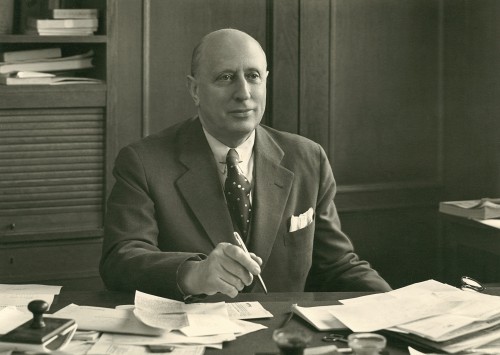
The inflation following the First World War, which reached its peak in 1923, led to a collapse of the German economy and banking system. The young company successfully navigated the problems that they faced. Economic conditions stabilised throughout the course of 1924. From a currency point of view, hyperinflation and the associated speculation on 15 November 1923, was brought to an end by replacing the German Papiermark with the Rentenmark (equivalent value to the subsequent Reichsmark).
During the 1920s and 1930s, the continually growing business focused on Germany, Central and Eastern Europe. The product range was extended to include soft hemp, flax as well as sisal and Abacá. The most important principle: “the customer comes first”; besides extensive services, this also included the ongoing market information. The company continues to issue trilingual jute market reports at monthly intervals and sisal market reports every few months, which attract a lot of international interest.
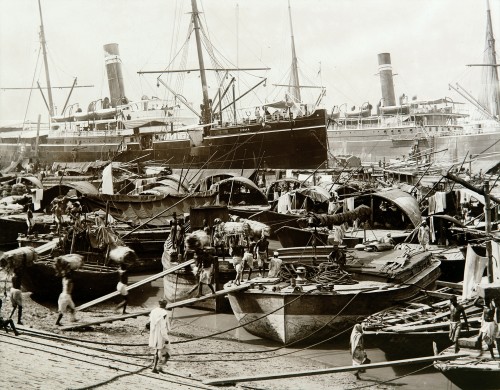
The company, in the same way as the foreign trading centre of Hamburg, was heavily impacted by the global economic crisis, combined with a marked decline in business. Although the Third Reich witnessed economic recovery, this went hand in hand with an increasingly drastic reduction of allocations of currency for imports.
This had major consequences for foreign trading companies such as Wilhelm G. Clasen, since import bans were now enacted even for raw materials, and monitoring and allocation bodies sprung up with a focus on Berlin.
The day-to-day business of merchants in Hamburg, and of course international traders in particular, suffered increasingly from bureaucratisation under a close-meshed monitoring network that became an obstacle of the first order. It was largely impossible to carry out transit operations under these conditions. The time of crosstrade had come, and it was here that Wilhem G. Clasen proved his extraordinary wealth of ideas and competency and was rather successful.
In the year 1935, Wilhem G. Clasen was elected Chairman of the Hamburg-based association involved in the trade of jute, hemp and flax. He was to remain Chairman of the association for more than 25 years.
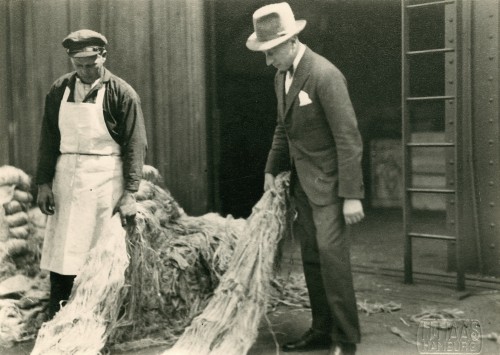
With the outbreak of the Second World War, it was now impossible to continue cooperation with foreign suppliers in countries outside the Third Reich’s sphere of influence. Purchase contracts already concluded were no longer fulfilled, and stocks stored abroad were confiscated.
The trade in raw materials from overseas procurement markets came to a standstill and the company had to fight to keep its head above water in the face of severe restrictions on the volume of business. It did this by trading with soft hemp and flax of Eastern European and Southeastern European provenance.
Yet, as the end of the war loomed the preconditions no longer even applied for this trade either and the company had to improvise by switching to trade with “substitutes”. This was similar to the conditions experienced immediately after the First World War. In the year 1943, the company offices belonging to Wilhelm G. Clasen suffered serious damage from bomb attacks and consequently the majority of the business documents were destroyed.
Foreign trade was entirely non-existent during the early post-war years. At first, the Allied Forces had completely prohibited foreign trade, and then they strictly limited it and for years only permitted it in such a way that it had to deteriorate further, before it could slowly recover.
It was not until the early fifties that Wilhelm G. Clasen’s business operations returned to normal and the trading company was able to revive its old connections, which except during wartime, had never been fully severed. At the same time, new connections were established overseas and in Europe. Further consolidating its market position made it possible to increase the importance of international business.
Other contributory factors benefiting the business development of Wilhelm G. Clasen was the so-called Korea boom on raw material markets, triggered by the Korean War, combined with a boost in prices.
The late 1950s witnessed an arousal of customers’ interest in natural fibre carpets and when people referred to natural fibres, they were almost exclusively talking about wall-to-wall sisal weave carpets. Sisal producers in Germany, Austria and Belgium satisfied this new demand resulting in a growing need for imports in sisal fibres. Unfortunately, the interest in sisal carpets was rather short-lived, not least, because it was impossible to avoid contamination. Consumers now directed their attention towards tufted carpets and gave them preference. It was only during the 1990s, that sisal carpets and runners experienced a rebirth; however, this time from China and at extremely low prices.
From the beginning of the 1960s, the trading activity was successively expanded to include the whole of continental Europe, opening up all global markets. Wilhelm G. Clasen became a company with global business connections. This expansion went hand in hand with a development of the product range to include additional natural fibres such as coconut, ramie, kapok and raw linter. It represented a logical step towards diversification, not least considering the situation for jute and sisal industries in Europe, which was becoming increasingly difficult in the light of growing liberalisation on imports and tough competition from low-income countries.
In mid-May 1966, Peter Clasen, son of the company founder and present-day Managing Partner, joined the company as a partner. In March 1969, the company looked back on 50 years of successful operations and a new era dawned for the company’s worldwide trade.
During the 1960s, the manufacture of jute felt evolved into a new sector of production within Europe. Various factories specialised in the manufacture of this product, which enjoyed strong demand as an underlay for flooring on the one hand, and as a sound-absorptive compound in the automotive industry on the other.
The liberalisation on imports in the countries then and later pertaining to the EU, meant that most of the jute spinning and weaving companies located in Western Europe no longer felt able to cope with the competition from the low-income countries of India and Bangladesh. This influenced their decision to discontinue spinning the yarns themselves and to purchase ready-made yarns from these countries instead. Belgian carpet weavers started to use kenaf yarn originating from Thailand rather than jute yarns from Belgian producers.
Wilhelm G. Clasen identified this opportunity and was one of the pioneers in the introduction of jute yarns from India and Bangladesh to EU countries, as well as playing an active role in importing kenaf yarn from Thailand. The knowledge gained in the process enabled Wilhelm G. Clasen to extend trading activity and become globally active in this sector in a way that was increasingly successful.
The end of restrictions on imports for jute goods in the 1970s opened the path for EU countries to become an important market for jute products.
The mid-1970s marked the start of a success story for composite materials made from natural fibres such as raw jute, hemp and flax with synthetic resins. These fibres were and still are used to manufacture moulded parts in the automotive industry in order to reduce the vehicle’s weight, as fuel prices had skyrocketed by then.
Faced with unrivalled low prices for jute finished products from India and Bangladesh, the German jute industry finally admitted defeat. Last but not least, it also became a victim of the so-called division of labour between the industrialised and developing countries. What is more, the jute industries in other European countries were also doomed, due to the competitive pressure from Asia.
This also applies to the once important sisal industry in Europe, which not only experienced the negative impacts of competition from low-income countries, but also of competition from polypropylene harvesting yarns, which were favoured by farmers due to their cheaper price. Of the formerly existing European sisal industry, there exist now only a handful of sisal spinning mills, and they are primarily located on the Iberian Peninsula.
Even those spinning mills, which were once located in Europe and which used to spin Manila hemp (Abacá) and produced cordage from this, have since disappeared from the market because low-cost competition from polypropylene also resulted in cordage being exclusively manufactured from PP yarns.
The timely adaptation of business relationships to market changes enabled the company to survive these periods unscathed. Furthermore, the company harnessed the new possibilities that arose for example as regards the innovative, promising areas of application for natural fibres.
In 1994, the company celebrated its 75th company anniversary. Thanks to business acumen, willpower and imagination, the family company now held an important position and belonged to one of the leading companies in its industry. In his letter of congratulation, the President of the Hamburg Chamber of Commerce referred to Wilhem G. Clasen as “a specialist for the countries in the Indian subcontinent”.
During that time, the company’s key focus was on China the previous the procurement market for natural fibres. During the first half of the 1990s, the former exporter became an importer as well as one of the most significant sales markets for the group of companies, while also serving as a procurement market for sisal yarns and fabrics.
The rise in demand for fibres for composite materials led to the founding of the joint venture Gerban Fibres Ltd. in Bangladesh in 2005 gerban.com. The company, jointly founded with a long-standing Bangladesh business partner, specialised in the processing of natural fibres, in particular for the automotive, paper pulp and construction industries. Gerban is ISO-9001 certified and is enjoying extraordinary success.
The year 2008 witnessed the founding of the company Wilhelm G. Clasen Services Ltd. in Dhaka as a subsidiary of the parent company in Hamburg. The intention was to exploit the advantages of a location in a low-income country, in order to increase the competitiveness of the WGC group of companies on the global market, especially in China and other highly contested markets. Moreover, at the same time, the aim was to utilise the benefits arising from bilateral trade agreements between Bangladesh and several Asian countries.
In 2011, the company in Dhaka was renamed Wilhelm G. Clasen (Bangladesh) Ltd. wgc-bd.com, and conducts trade with raw jute, jute yarns and jute products on a global scale.
Increasing oil prices, the discussion on climate change and the corresponding political pressure to reduce CO2 emissions since 2009, are factors that have attracted renewed interest in and provided new uses for jute and other natural fibres.
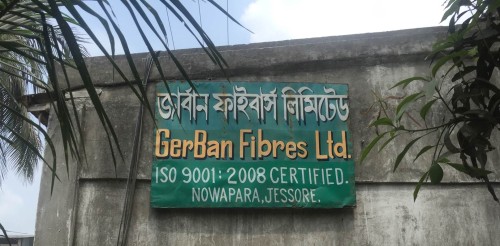
Natural fibres are more than ever “en vogue”. Demand is increasing, but at the same time prices are rising and many customers are purchasing directly from the source. The branch in Dhaka has been able to assert itself well in these years, because the company is managed in accordance with the values of its parent company in Germany. Reliability in quality and adherence to deadlines have top priority, enabling the binding of customers to WGC (Bangladesh) Ltd. on a long-term basis.
The GerBan joint venture has succeeded in consolidating its position, especially during this period. Suppliers to the automotive industry and also paper and pulp manufacturers are now placing long-term contracts, so that the excellent capacity utilization at the end of the decade is resulting in various modernisation measures and further expansion of capacity. GerBan is now one of the leading and most renowned producers of jute slivers in Bangladesh with a worldwide customer base.
An industry that used to be more of a niche and was considered "non-traditional" is gaining importance in these years: The construction industry in Saudi Arabia, Middle East, North African and West African countries, where sisal fibres are used for gypsum/plastering work. This additional demand is one of the factors that brought prices to a comparatively high level during this period.
Especially in the last years of this decade the company has been able to strongly expand its position in Ecuador and the exported quantities of abaca fibres are increasing, not least due to the very good cooperation with strong local partners.
Towards the end of the decade the company of Wilhelm G. Clasen celebrates its 100th anniversary in Hamburg together with high-ranking guests.
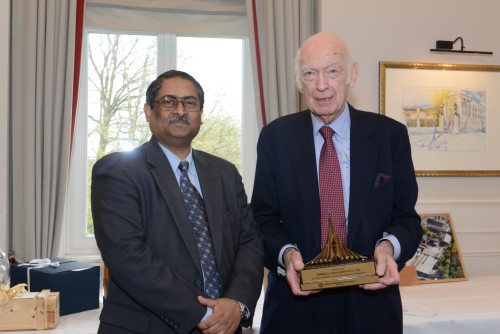
At the headquarters in Hamburg, skilled staff, with a wealth of experience, is currently helping to expand existing business relationships and to ensure the smooth running of the global imports, transit operations and exports.
They all know what it is about – the raw materials business, a highly sensitive market, depending on an unspeakable amount of impacts.